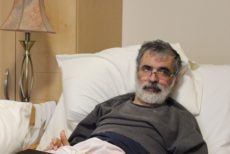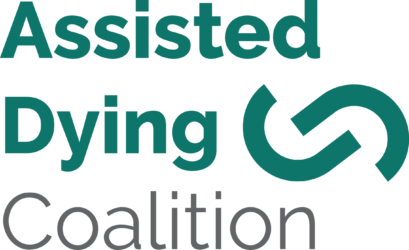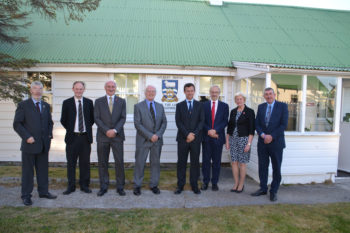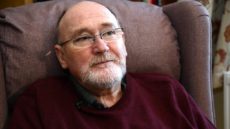
Humanists UK member Omid T, who was awaiting judgement from the High Court on his legal case seeking to change the law on assisted dying, has died this morning at the assisted dying clinic Lifecircle in Switzerland, Humanists UK has announced.
Omid had multiple system atrophy (MSA) and Humanists UK has been supporting his legal case.
Humanists UK Chief Executive Andrew Copson said:
‘We are deeply saddened by the death of our member Omid T, who ended his life with medical assistance at Lifecircle in Switzerland today.
‘It is a tragedy, and also a national scandal, that Omid had to go to Switzerland to die with dignity. His desire was for a peaceful ending to his life here in England and his case underscores the need for our Parliament to allow people in his position the dignity of choice in their own country.
‘While not terminally ill, Omid was suffering immensely from his condition. He was bedridden, unable to move without assistance, in pain every day and found his life intolerable.
‘Of course, in any assisted dying law there must be strict legal safeguards in place. But being able to die, with dignity, in a manner of our choosing must also be understood to be a fundamental human right. Omid’s fight to change the law and claim that right for all of us will be his enduring legacy.
‘Omid was a passionate humanist and lived his own life to its fullest. Our deepest condolences are with his family, friends, and everyone else who was touched by his life.’
Update: On 9 October 2018, five days after Omid died at the Lifecircle clinic in Switzerland, the High Court ruled against Omid’s legal team in a preliminary matter to his challenge to the assisted dying law. His team had argued that they wanted to be able to cross-examine expert witnesses at the hearing but it was determined that they could not. How his case proceeds from here remains to be seen.
In handing down its decision, the court expressed sympathy and sadness for Omid’s case.
Omid’s story
When Omid first announced his case he told his story as follows:
‘I was born in Iran and came to the UK aged 12 in August 1975. I am a British Citizen. I started working at the age of 17 and have worked all my life as a property developer until about 2008, when the first signs of my illness appeared.
‘I have also experienced the joy of being married and having children. I married my wife on 10th August 1990, aged 27 and we have 3 children. We separated on 30th March 2015. I don’t want people to see me suffering and don’t want my children to remember me as I am now. This is my choice, rather than theirs.
‘The first signs of my illness were that my speech became very slurred and when I spoke on my mobile the listener could not understand me. I also began to experience difficulty in walking, writing and with other tasks.
‘In 2014, I was diagnosed with the incurable illness, Multiple System Atrophy (MSA), by consultants at the National Hospital for Neurology and Neurosurgery in London. Now I am largely confined to my bed, have to wear a catheter bag and need help with all my personal care. My speech has deteriorated and the muscle weakness continues apace.
‘I tried to end my life by taking an overdose in 2015, but I failed! I don’t have the ability to take my own life anymore and I don’t want to botch it up again anyway.’
Notes
For further comment or information, please contact Humanists UK Director of Public Affairs and Policy Richy Thompson at richy@humanism.org.uk or on 0781 55 89 636.
Details of the case
Omid has been represented by Saimo Chahal QC (Hon) of Bindmans LLP and Paul Bowen QC of Brick Court Chambers, who previously represented Tony and Jane Nicklinson and Paul Lamb, and Debbie Purdy before that as well. Humanists UK was intending to intervene in his case, working with Nancy Collins of Hodge Jones & Allen LLP alongside Caoilfhionn Gallagher QC and Graeme Hall, both of Doughty Street Chambers.
A court order prevents the name, address, or schools of Omid’s wife and children, or any personal details about them, including their photographs or images, from being published, as he did not want them to be contacted or disturbed in any way. Omid is referred to as Omid or T and his surname and the address of his home cannot be disclosed, under the terms of the same court order.
Omid had a preliminary hearing on some aspects of his case before the High Court earlier this year. A judgment on that preliminary hearing is expected shortly.
Read our previous news statement on Omid T’s case at: https://humanism.org.uk/2017/05/22/omid-granted-permission-to-challenge-illegality-of-assisted-dying/
Omid T was represented by Bindmans LLP. Read its statement: https://www.bindmans.com/news/omid-t
Read more about Humanists UK’s campaigns work on assisted dying: http://humanism.org.uk/campaigns/public-ethical-issues/assisted-dying/
At Humanists UK, we advance free thinking and promote humanism to create a tolerant society where rational thinking and kindness prevail. Our work brings non-religious people together to develop their own views, helping people be happier and more fulfilled in the one life we have. Through our ceremonies, education services, and community and campaigning work, we strive to create a fair and equal society for all.


 ds Legislative Assembly has
ds Legislative Assembly has